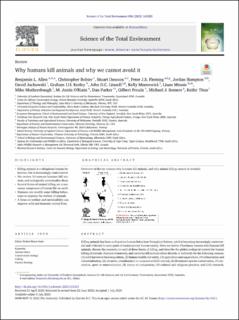| dc.description.abstract | Killing animals has been a ubiquitous human behaviour throughout history, yet it is becoming increasingly controversial and criticised in some parts of contemporary human society. Here we review 10 primary reasons why humans kill animals, discuss the necessity (or not) of these forms of killing, and describe the global ecological context for human killing of animals. Humans historically and currently kill animals either directly or indirectly for the following reasons: (1) wild harvest or food acquisition, (2) human health and safety, (3) agriculture and aquaculture, (4) urbanisation and industrialisation, (5) invasive, overabundant or nuisance wildlife control, (6) threatened species conservation, (7) recreation, sport or entertainment, (8) mercy or compassion, (9) cultural and religious practice, and (10) research,education and testing. While the necessity of some forms of animal killing is debatable and further depends on individual values, we emphasise that several of these forms of animal killing are a necessary component of our inescapable involvement in a single, functioning, finite, global food web. We conclude that humans (and all other animals) cannot live in a way that does not require animal killing either directly or indirectly, but humans can modify some of these killing behaviours in ways that improve the welfare of animals while they are alive, or to reduce animal suffering whenever they must be killed. We encourage a constructive dialogue that (1) accepts and permits human participation in one enormous global food web dependent on animal killing and (2) focuses on animal welfare and environmental sustainability. Doing so will improve the lives of both wild and domestic animals to a greater extent than efforts to avoid, prohibit or vilify human animal-killing behaviour. Animal ethics Conservation biology Culling Factory farming | en_US |

